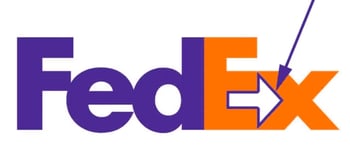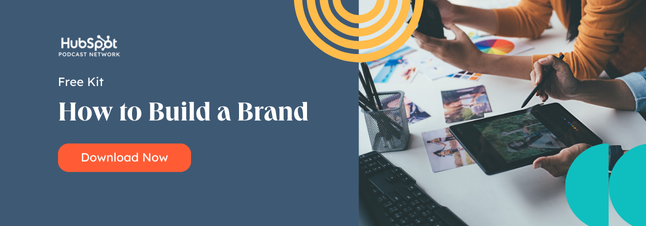
When it comes to your business’ branding strategy, establishing a logo is one of the most critical tasks.
Your logo will be pervasive throughout your marketing campaigns, and it’s one of the most prominent branding elements people will think of when someone mentions your company.
Mounting research backs up how important a logo can be to your brand. In fact, a recent study from the Journal of Marketing Research found that an effectively designed logo can “influence brand evaluations, purchase intentions, and brand performance.”
Not sure what it takes to create a killer brand logo? To give you a better idea, check out our list of stand-out logos below.
Logo Examples
1. Geometric Logos
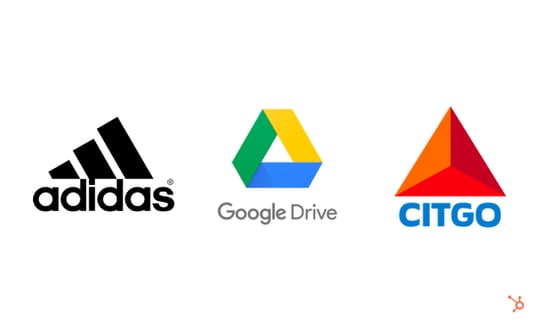
Geometric shapes are highly effective at creating stylish and fun designs. Some can even evoke feelings of movement. It’s particularly popular amongst big brands from Google to Adidas — also proving that you don’t need to belong to a specific industry to use it. The final result is often a clean and modern design.
2. Negative Space Logos
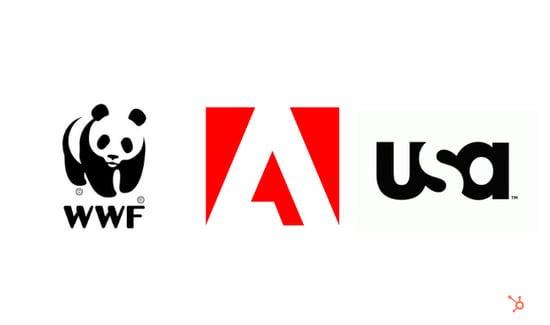
Negative space logos are all about leveraging what you don’t see. Because these logos take more thought to execute, you can typically spot subtle meanings. For instance, you may see hidden letters, icons, or names. A great example is the FedEx logo which uses negative space to create an arrow between the “e” and “x” letters.
You don’t have to be super obvious with your negative space. Often, these logos use it to add small details that complement the main visual.
3. Typography-Based Logos
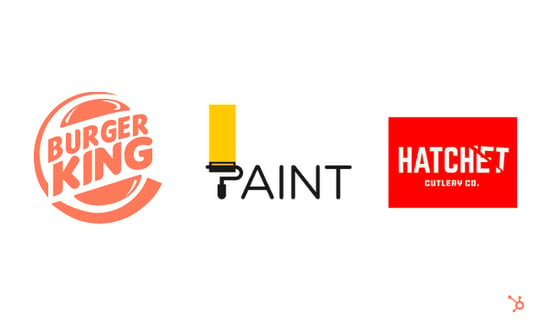
Typography can add a clever spin on traditional logos. We often see two varieties — one where typography enhances the imagery (see Hatchet), and the other where typography is incorporated within the imagery, giving it structure (see Burger King).
In the examples above, we see the text and graphics working in harmony — in other words, you can’t have one without the other.
4. Hand-Drawn Logos
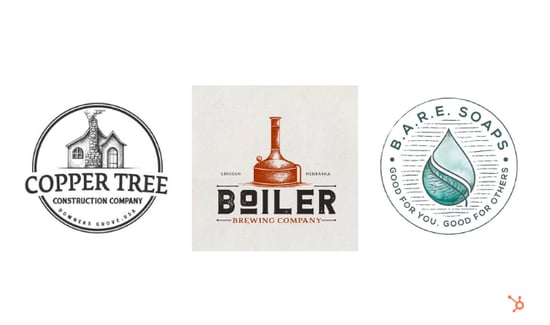
Hand-drawn logos feel similar to a personal signature. It gives brands an authentic, rustic, down-to-earth, and even child-like feeling. Most incorporate a sketch of a scene, object, idea, or symbol. Because no two hand-drawn designs are alike, this style almost guarantees a unique and original logo.
5. Overlapping Logos
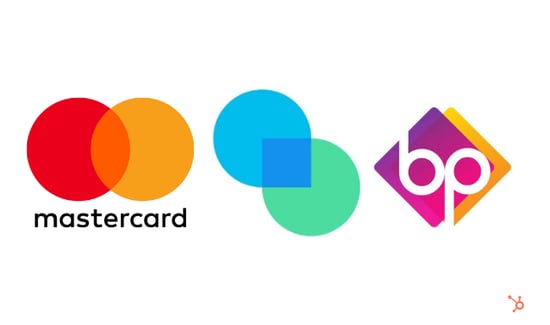
By using multiple layers, you can create more complex and colorful logos without overwhelming the viewer. It’s an effective strategy that “interrupts” visual elements — or even text — within a design. That said, these logos can be hard to pull off without a designer, so we recommend leaving this trend to the professionals.
Logo Examples in Ads
6. McDonald’s
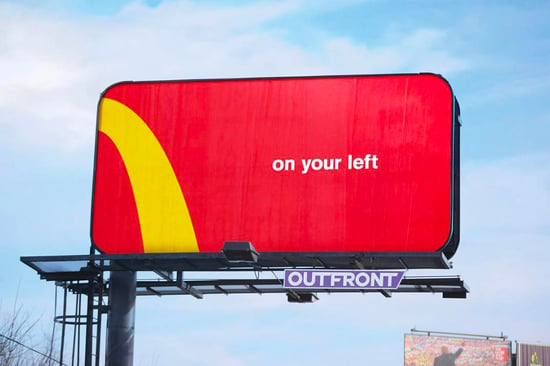
McDonald’s “Follow the Arches” campaign highlights the power of logos — even if you can’t see all of it.
It features a portion of its golden arches logo along with a simple line of text — such as “On your left” and “On your right.” With the creative use of its logo and signature colors, consumers instantly recognize the brand — and know that it’s just around the corner.
7. Curtis
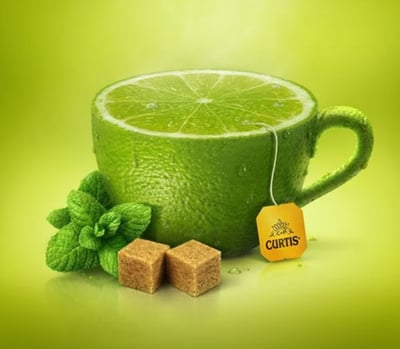
Curtis brings the smell and taste of fruit to life. Add the steam on top, and your mouth begins to water. The yellow logo on the tea label also brings a nice contrast to an otherwise monotone color scheme.
8. Nescafé
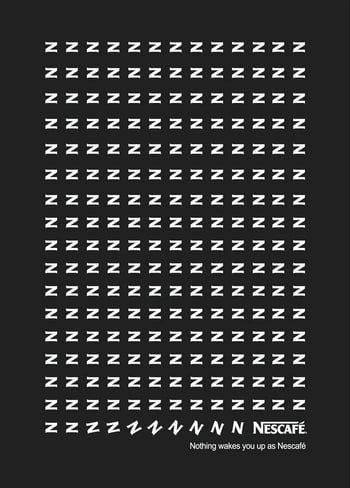
This black-and-white ad for Nescafé features rows and rows of zig-zags. It seems confusing at first, until you read the tagline, “Nothing wakes you up as Nescafé.”
Suddenly, these zig-zags become Z’s to represent sleep, and they eventually “wake up” and transform into the Nescafé logo. It’s a playful ad that uses symbols to illustrate the relationship between sleep and coffee.
Logo Examples in Literature
9. Underhill Press
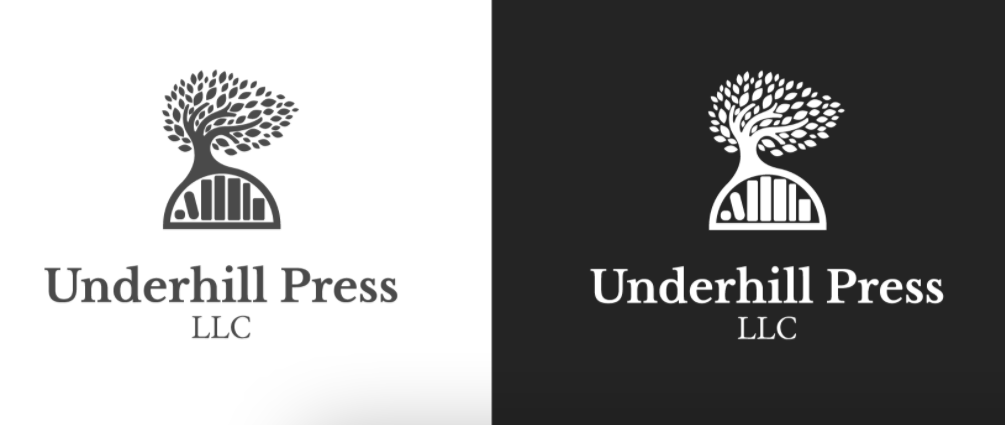
Here’s another example of an ad that uses the power of symbolism in its logo. Books are born from trees — which is an obvious comparison. But trees also symbolize wisdom, growth, and learning — which artfully plays into the brand’s ethos. Trees are also a critical resource to the environment, as books are to people.
10. Rosebery
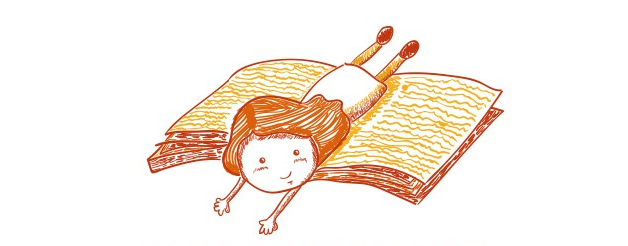
You can see a logo a hundred times without recognizing its full meaning — which is why I like this logo in particular.
Not only does it depict a child reading, but the book also doubles as wings. You can interpret it in multiple ways — for example, books can give kids wings to unleash their imagination or understand the world around them. It’s an effective logo that calls for a second — or even third — glance.
Sources for Logo Inspiration
Arguably the hardest part of creating a logo is knowing where to start. To light your creative spark, we’ve compiled a list of logo inspiration to get the ball rolling.
1. Creative Market
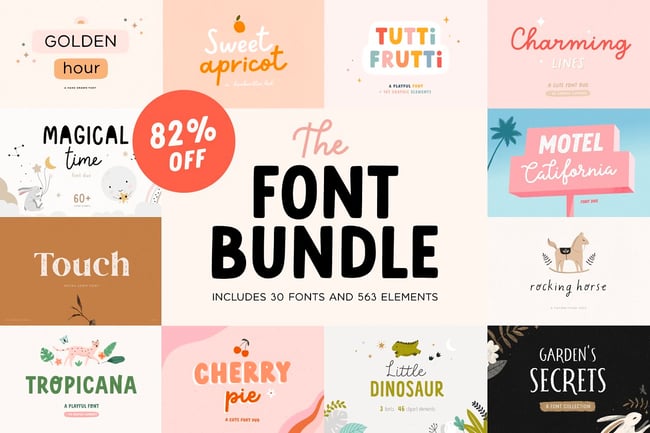
Creative Market is a designer’s playground with over 3 million unique fonts, graphics, themes, photos, and templates.
Use the search bar to browse through logos that match your style or profession. If something catches your eye, you can purchase and download designs right on the platform — or simply use it to gather inspiration.
2. Dribble
Dribble operates as an online portfolio for designers. In fact, it’s one of the largest platforms for designers to share and promote their work — making it an ideal hub for finding inspiration.
Plus, if you want to hire a professional, you can contact artists directly on Dribble or use its Project Board to post a job.
3. Logoimport

Logoimport is an Instagram account that shares designs, illustrations, and graphic inspo from various designers. The account does a great job of tagging the artist on each post, so if something piques your interest, you can view more of an artists’ work with just a few taps.
4. Behance
Owned by Adobe, Behance is a social media platform for artists to showcase and share their creative work.
What’s unique about Behance is its advanced search functionality. Want to browse logos that are all blue? No problem. Want to browse logos that are solely made with Photoshop? You can do that, too. With Behance, you can quickly narrow your searches to see the most relevant designs.
Logo Samples That Anyone Can Use
You don’t need to hire a professional designer — or have an extensive background in graphic design – to create an eye-catching logo. Instead, online resources can help you design one in just a few steps. Take a look at our list below:
1. Canva Templates
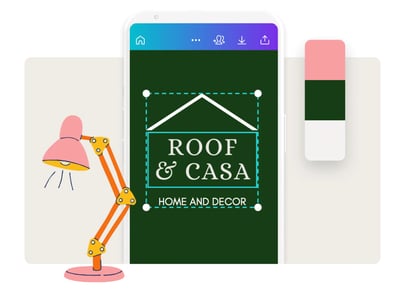
If you can’t pin down exactly what you want your logo to look like, try browsing through Canva’s premade design templates. Once you land on a design you like, simply click to download it. This will open the Canva editor where you can customize the text and color scheme of your logo.
Keep in mind that some Canva templates are free, while others may require a Pro account.
2. Logomakr
Logomakr is a tool that allows you to design a logo from scratch with thousands of stock icons and hundreds of fonts. If that’s too much of a feat, you can simply use one of its templates and customize the text, color, and graphics to match your branding.
Although Logomakr is a free tool, you have the option to pay for professional assistance should you need help designing your logo.
3. Logo Garden
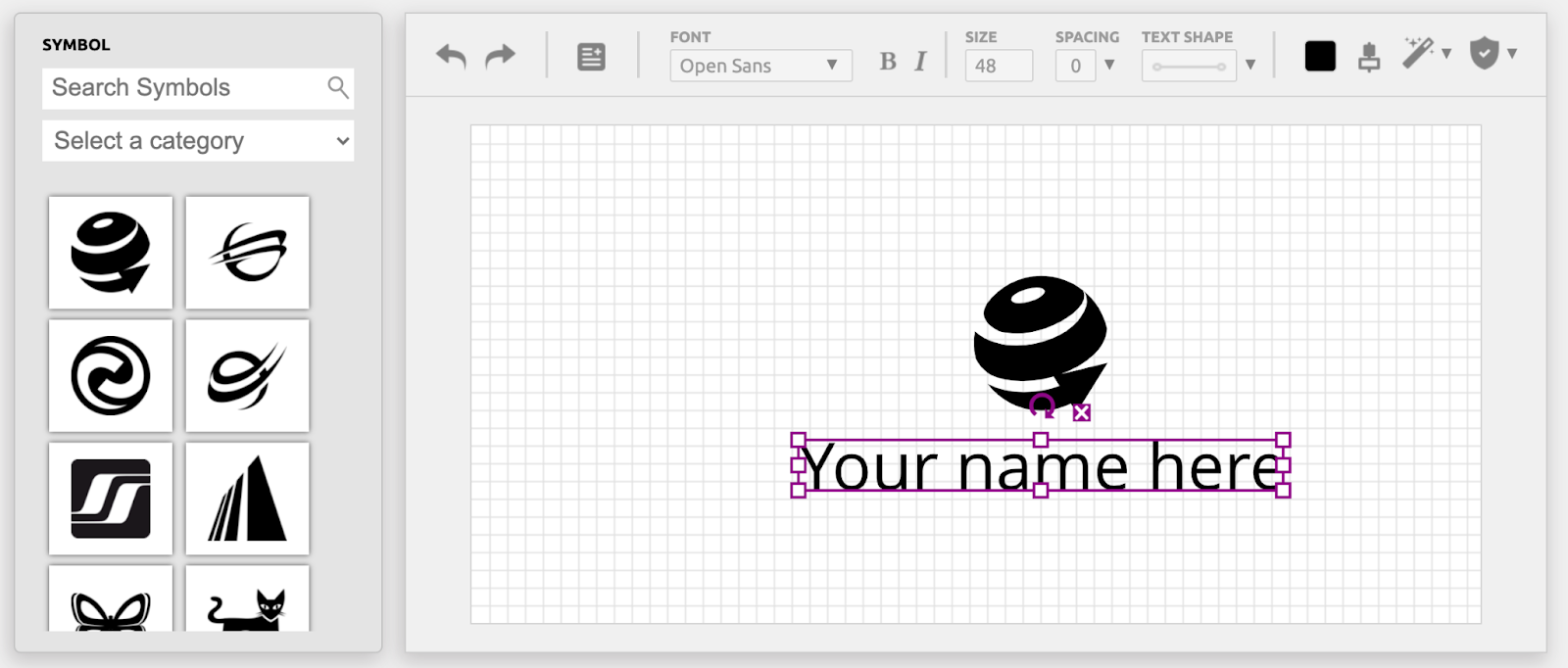
If you think it takes days to create a logo, Logo Garden, a design tool, says it can be done in minutes. Its software contains a vast library of graphics, fonts, and colors to build even the most intricate logos. If you get stuck along the way, it also offers design tips and videos to guide you.
After the design is complete, just download it to your computer for a small fee.
4. Designimo
Designimo is a great starting point for anyone feeling overwhelmed by the design process. When you visit the website, you are prompted to share your company name. Once you do so, it will open a new screen with a variety of logos that feature your company name.
From here, you can visualize what style and colors best fit your brand. Or, narrow down your search results by industry — such as real estate, health care, or apparel. This will populate the most relevant designs to pick from.
5. GraphicSprings

GraphicSprings is a design software that promises beautiful logos in three easy steps — first, pick a template from its library, which are categorized under different industries. Then, edit the graphic and text of your logo with its easy drag-and-drop menu. Lastly, download your design for a small fee. Voila, it’s just that simple.
Creating an Effective Logo
Even if you think you’ve landed on a perfect design that’s classic, memorable, and valuable to your messaging, it can be helpful to look at what brands around you are doing to modernize, evolve, or improve their own designs. This way, when it’s time for your logo to get a refresher, you’ll be ready with some great ideas.

